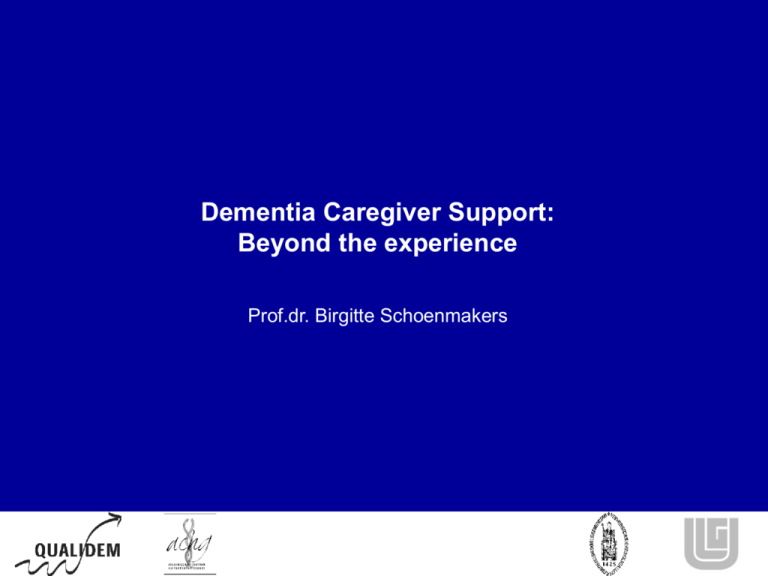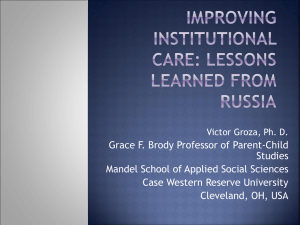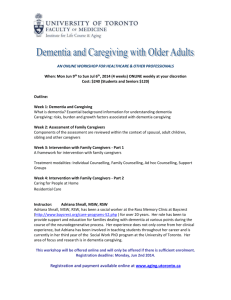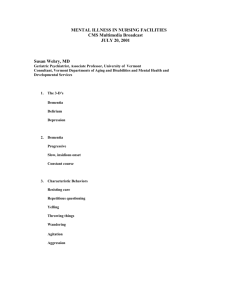Results
advertisement

Dementia Caregiver Support: Beyond the experience Prof.dr. Birgitte Schoenmakers I. INTRODUCTION Homecare is of increasing importance in long term care of dementia patients • prevalence of dementia home care in Belgium is 70% • Home care in Belgium affects 2 000 000 relatives and informal carers • Waiting lists for residence admission • Growing evidence that presence of family carers on dementia patient outweighs the effects of psychotropic drugs Sources: FOD Volksgezondheid, Kenniscentrum I. INTRODUCTION Institutionalization • 80% of all definitive dementia home care endings is related to depressed caregiver • Dementia is independent risk factor for definitive institutionalization • Costs of home care exceed costs of residential care • Number of applications largely exceeds number of places Conclusions • Process of decision making focus of future research • Home care not unconditionally best solution Focus on avoiding abrupt home care Sources : Qualidem 2006, Schoenmakers B, ea, (2008) . Int J Geriatr Psychiatry. 2008 Oct 21. II. BACKGROUND High volumes of literature on dementia home care until last decade • Conflicting results • Due to methodological issues • Due to a lack of consensus definition of dementia caregiver • Focus on wellbeing of dementia patients • Patient related outcome measures • Support directed to patient II. BACKGROUND Definition • Family caregiver: first described, not defined, in 1982 (Rabins, P) based upon literature, policy guidelines and consensus in focus group discussion following definition was composed: “a family caregiver is person who from obvious reasons and on a regular base offers care to a care depending related person in his direct environment and who is not committed to any formal or professional care system” II. BACKGROUND Outcome measures Depression • Depressive mood – mild depression • Wellbeing rather than psychiatric diagnosis • Screen in a sensitive way cases at risk • Adopted by international consensus (Interdem 2008) Burden • Subjective workload • no psychiatric equivalent • state of mind over short time span Coping • Problem facing strategy • Adjustable over time and by learning II. BACKGROUND Theoretical framework of this research i. assumption: dementia caregivers are overloaded • Stressors of various origins • Mutual influence of wellbeing • Direction of causality based upon literature • Negative impact of care giving outweighs the positive aspects • Wellbeing of care is determinative factor in home care ii. assumption: support should focus more on caregiver • Negative care impact can be lowered by support • Support highly appreciated but inefficient • No need of new support but facilitation of admittance III. RESULTS 1. Impact of care-giving Literature Impact of care-giving is substantial • Depression in 30-80% of dementia caregivers: Higher prevalence as compared to caregivers of other chronically ill patients • Role of individual stressors unclear • Caregiver related features? •Age, gender, relation, socio-economic status • Patient related features? •Care need, behavioural disturbances, continence Positive aspects related to care-giving • Unfortunately not in balance with negative impact Source: Schoenmakers B ea. (2010). Maturitas, 2010, march 20 III. RESULTS 1. Impact of care-giving On the field Methods • population survey (n= 105) • Dementia versus non dementia caregivers • Primary outcome measures: depression and burden Results • 30% depression in caregivers • Onset of depression in dementia caregivers was unrelated to patient characteristics • Depression was triggered by burden and an inefficient coping strategy • Depression rates decreased after 1 and 3 years of follow up... strong survivors? normal fluctuation? intervention effect of visits? Source: Schoenmakers, B, ea. (2008). The European journal of general practice 2009 July 4:1-8. III. RESULTS 1. Impact of care-giving Conclusions • Dementia care-giving is a heavy job • Patient characteristics are not the main determinants of a negative care impact • Coping predicts the care impact • Care impact fluctuates over time III. RESULTS 1. Impact of care-giving Implications for further research and policy guidelines • Inventory of objective care need should be completed with ratings of care need by caregiver • Coping concept should be explored as the link between stressor and impact in dementia home care • Intervention in home care should be altered along the above principles III. RESULTS 2. Support to caregivers Literature results: non pharmacological interventions 6 large groups of interventional strategies Psychosocial interventions, respite care, multi-media based support, case management, physical exercise, communication skills Highly appreciated but with poor efficacy in terms of outcome measures • Slightly positive effect of psychosocial intervention on burden • Slightly positive effect of case management on depression Source: Schoenmakers, B, ea. (2009) Aging and Mental health, April 2009 III. RESULTS 2. Support to caregivers Literature results Methodological issues • Population bias: recruited from health care centres • Small sample sizes: burden of participation • Poor reporting of carer characteristics: focus on patient • Short term follow up: 6 to 12 months, while a mean duration of home care is 3 to 5 years • Control conditions lacked: waiting lists, augmented usual care III. RESULTS 2. Support to caregivers Literature results: Pharmacological approach Strategy: Suppression of troublesome behaviour by psychotropic drugs Assumption: behavioural disturbances important source of stress in caregivers Drug-types: cholinesterase-inhibitors, anti-psychotic drugs, antidepressants Results: caregiver time spent and burden decreased over a short term follow up Critical issues • Sample bias • Duration of drug administration • No sufficient data on caregivers Source: Schoenmakers, B, ea. (2009) Fam Pract. 2009 Aug;26(4):279-86 III. RESULTS 2. Support to caregivers Literature results: the GP’s role • Attitude of GP: aware of skills and limits, theoretical knowledge good, disclosing diagnosis weak but confident in treatment matters, time consuming and frustrating no key role? • Expectations of relatives: find GP helpful and comprehensible but regret lack of empathy and time • Needs of GP and relatives: education, care support Source: Schoenmakers, B ea. (2009). Scandinavian Journal of Primary Healthcare, 2009; 27 (1). III. RESULTS 2. Support to caregivers Literature results on support to caregivers Conclusions • Efficacy of home care is disappointing • No instant or long term effect on wellbeing of caregiver • No need for new or more sophisticated supportive interventions • Need for fine-tuning existing support and facilitating of accessibility • Non pharmacological support combined with a pharmacological approach under certain conditions III. RESULTS 3. Field study: the evidence Background Dementia care-giving is stressful Premature or acute home care ending in 80% of cases directly related to depressed caregiver Adequate coping-strategies protect against care impact Objective care need of patient is not related to stress in caregiver Interventions are highly appreciated but mainly ineffective No need for new interventions III. RESULTS 3. Field study: the evidence Research question “Will the intervention of a care counsellor, supporting In a non hierarchical, multi-disciplinary quasi unstructured way prevent from depression in the family caregiver? “ Methods Randomized controlled design • no blinding but subjects were not informed of ongoing intervention Frail community dwelling elder, labelled with cognitive impairment • Minimum of care dependency • Screening with MMSE, excluded >22/30 III. RESULTS 3. Field study: the evidence Methods Care counsellor intervening on fixed moments Three monthly visit, monthly phone call, within permanent reach Control group passively directed to usual care systems Outcome measures: • Primary: depression in caregiver • Secondary: anxiety, burden, coping • Quantitative inventory of care support III. RESULTS 3. Field study: the evidence Results at baseline Sample size n=62 100% visited by home nurse (see recruitment strategy) 50% visited by home assistant, physiotherapist or cleaning service 30% of all caregivers depressed, most felt burdened Patients showed • moderate to high frailty • mild to moderate cognitive decline • In 30% behavioral disturbances • In 75% continence problems III. RESULTS 3. Field study: the evidence Results after one year Odds ratio for depression in treatment versus control arm was 0.16 (confidence interval 0,03-0,83) • Odds ratio was not influenced by patient or caregiver characteristics: Due to small sample size multivariate analysis was not feasible therefore 0dds ratios were calculated for each variable III. RESULTS 3. Field study: the evidence Results after one year Intervention overview • One extra phone call • 10 applications for support • Only 4 carers asked extra visit • 6 carers were proposed a new intervention, only 3 effectively carried out • No significant difference between help seeking carers and others Formal care support remained stable in both groups III. RESULTS 3. Field study: the evidence Discussion important decrease in depression rates while formal support remained stable: • Hawthorne effect? - Carers not informed of ongoing trial - no decrease of depression in control group • mean depression scores were equal in both groups: - only mildly depressed caregivers took advantage of intervention Weakness: • Small sample size • Effect higher than expected Strenghts: • Control group conditions • Low impact on daily living of carer III. RESULTS 3. Field study: the evidence Discussion Comparison with other trials • Callahan 2006: control group with augmented care • Charlesworth 2008: befriending to carers • Case management programs: fixed program, not adjusted to individual needs III. RESULTS 3. Field study: the evidence Conclusions Implications for further research and daily practice • Caregivers organize home care themselves • Home care remains stable, independently of feelings of burden or depression • Minimal intervention of care counsellor and permanent availability can make the difference • Home care should become more accessible • Institutionalization as outcome measure? Long term follow up • Cost analysis? IV. CONCLUSIONS Family caregivers are a frail but indispensable link in home care Frailty as hidden patient Partner in care Family caregivers organize home care themselves in a more or less successful way Professional caregivers inventory home care in an objective way but do not fully meet the needs of family carers Interventions are therefore appreciated but can be more effective by fine-tuning on individual needs focus on both patient and carer Permanent availability Home care landscape is extended but fragmented: Personal guide through home care could alter depressive feelings and prevent from premature home care ending Source: Schoenmakers, B, ea. (2008) Editorial, Dementia 2008.








